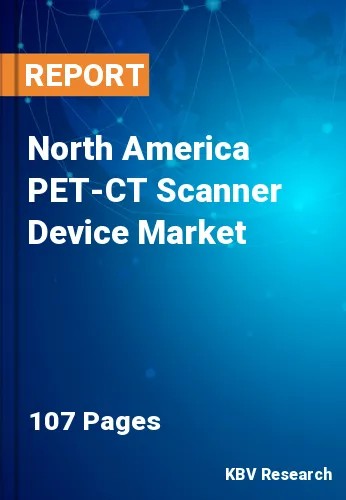The North America PET-CT Scanner Device Market would witness market growth of 5.0% CAGR during the forecast period (2021-2027).
PET and CT scans are used to diagnose a variety of diseases, including cancer, heart disease, and certain brain abnormalities. Additionally, PET scanners detect metabolic activity, while CT scanners reveal anatomical details. The risk of improper superimposition of different imaging is reduced, and the hybrid PET-CT procedure makes the scanning process easier for the patient. Moreover, PET-CT scanner hybrids combine the advantages of two well-established imaging modalities to aid in accurate illness diagnosis, localization, and monitoring. Furthermore, PET-CT scanners can record images in a very short amount of time (less than a minute).
Some of the main players in the PET-CT scanner devices market are concentrating their efforts on expanding their distribution networks in order to expand their offerings and availability across several areas. For example, Philips and Paracelsus Clinics announced an eight-year strategic partnership 2020 to explore solutions that would make imaging equipment more accessible. Moreover, this partnership would aid in the use of digitization and product optimization to increase quality and efficiency. As a result, devices are projected to give all beneficial solutions in the medical industry, promoting the growth of the PET-CT scanner devices market.
According to the National Center for Health Statistics, heart disease was the top cause of death in the United States in 2011, killing more than 600,000 individuals. According to the Centers for Disease Control and Prevention (CDC), approximately 22,000 men and 9,000 women in the United States are diagnosed with liver cancer each year, with approximately 16,000 men and 8,000 women dying from the disease.
According to the Alzheimer's Association, over 5 million individuals were expected to be living with Alzheimer's disease in 2017, making it the sixth-leading cause of death in the United States. According to the Centers for Disease Control and Prevention (CDC), around 282,000 persons in the United States were diagnosed with brain injury in 2013, and approximately 50,000 people died as a result of traumatic brain injury. It is thought to be a leading cause of disability and death in the United States.
According to the National Oncology PET Registry, PET/Computer Tomography systems are employed in around 84 percent of the little more than 1,600 PET facilities in the United States. For nuclear imaging business participants, the growing number of cancer cases gives significant prospects. According to the American Cancer Society (2019), the total number of new oncology cases diagnosed in 2019 is expected to be around 1,762,450, up from 1,735,350 in 2018.
The US market dominated the North America PET-CT Scanner Device Market by Country in 2020, and would continue to be a dominant market till 2027; thereby, achieving a market value of $697.9 million by 2027. The Canada market is poised to grow at a CAGR of 7.4% during (2021 - 2027). Additionally, The Mexico market would experience a CAGR of 6.5% during (2021 - 2027).
Based on Slice Count, the market is segmented into Medium Slice Cardiology (64 Slices), Low Slice Cardiology (<64 Slices), and High Slice Cardiology (>64 Slices). Based on Isotope/Detector Type, the market is segmented into Flurodeoxyglucose (FDG), 62Cu ATSM, 18 F Sodium Fluoride, FMISO, Gallium, Thallium, and Others. Based on Service Provider, the market is segmented into Hospitals, Diagnostic Centers, and Research Institutes. Based on Type, the market is segmented into Stationary Scanners and Portable Scanners/Mobile Scanners. Based on Application, the market is segmented into Oncology, Cardiology, Neurology, and Others. Based on countries, the market is segmented into U.S., Mexico, Canada, and Rest of North America.
Free Valuable Insights: The Global PET-CT Scanner Device Market is Estimated to reach $2.6 Billion by 2027, at a CAGR of 5.5%
The market research report covers the analysis of key stake holders of the market. Key companies profiled in the report include Bruker Corporation, Toshiba Corporation, Siemens Healthineers AG (Siemens AG), General Electric (GE) Co. (GE Healthcare), Koninklijke Philips N.V., Shimadzu Corporation, Positron Corporation, PerkinElmer, Inc., Mediso Ltd., and Hitachi, Ltd. (Hitachi Healthcare).
By Slice Count
By Isotope/Detector Type
By Service Provider
By Type
By Application
By Country
Our team of dedicated experts can provide you with attractive expansion opportunities for your business.

